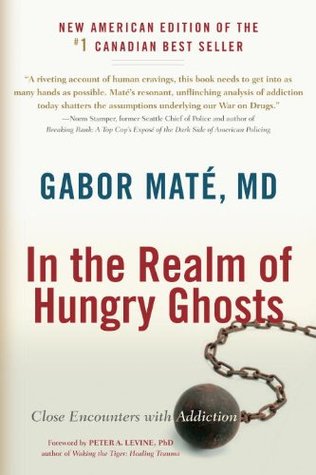More on this book
Community
Kindle Notes & Highlights
by
Gabor Maté
Read between
October 1, 2024 - January 12, 2025
Today many clinics across the country have lengthy waiting lists, and researchers estimate that some twenty million Americans who could benefit from treatment are not getting it. The costs in human suffering, family disintegration, and lost productivity are staggering. The lingering questions remain, What is effective treatment? and How can it best be administered?
“What is addiction, really?” the Swiss psychologist Alice Miller asks. “It is a sign, a signal, a symptom of distress. It is a language that tells us about a plight that must be understood.”
The inhabitants of the hungry ghost realm are depicted as creatures with scrawny necks, small mouths, emaciated limbs, and large, bloated, empty bellies. This is the domain of addiction, where we constantly seek something outside ourselves to curb an insatiable yearning for relief or fulfillment. The aching emptiness is perpetual because the substances, objects, or pursuits we hope will soothe it are not what we really need. We don’t know what we need, and so long as we stay in the hungry ghost mode, we’ll never know. We haunt our lives without being fully present.
Drug addicts are often dismissed and discounted as unworthy of empathy and respect. In telling their stories my intent is twofold: to help their voices to be heard and to shed light on the origins and nature of their ill-fated struggle to overcome suffering through substance abuse. They have much in common with the society that ostracizes them. If they seem to have chosen a path to nowhere, they still have much to teach the rest of us. In the dark mirror of their lives, we can trace outlines of our own.
“The only home he’s ever had”—a phrase that sums up the histories of many people in the Downtown Eastside of “one of the world’s most livable cities.”1
If in doubt, ask yourself one simple question: given the harm you’re doing to yourself and others, are you willing to stop? If not, you’re addicted. And if you’re unable to renounce the behavior or to keep your pledge when you do, you’re addicted.
There is, of course, a deeper, more ossified layer beneath any kind of addiction: the denial state in which, contrary to all reason and evidence, you refuse to acknowledge that you’re hurting yourself or anyone else. In the denial state you’re completely resistant to asking yourself any questions at all. But if you want to know, look around you. Are you closer to the people you love after your passion has been fulfilled or more isolated?
The difference between passion and addiction is that between a divine spark and a flame that incinerates. The sacred fire through which Moshe (Moses) experienced the presence of God on Mount Horeb did not annihilate the bush from which it arose: “And YHWH’s messenger was seen by him in the flame of a fire out of the midst of a bush. He saw: here, the bush is burning with fire, and the bush is not consumed!”4 Passion is divine fire: it enlivens and makes holy; it gives light and yields inspiration. Passion is generous because it’s not ego-driven; addiction is self-centered. Passion gives and
...more
Self-esteem is not what the individual consciously thinks about himself; it’s the quality of self-respect manifested in his emotional life and behaviors. By no means are a superficially positive self-image and true self-esteem necessarily identical. In many cases they are not even compatible. People with a grandiose and inflated view of themselves are missing true self-esteem at the core. To compensate for a deep sense of worthlessness, they develop a craving for power and an exaggerated self-evaluation that may itself become a focus of addiction, as it appears to have done for the person who
...more
This highlight has been truncated due to consecutive passage length restrictions.
Mindfulness practice will not by itself cool the addiction-heated mind, but, addicted or not, it is an invaluable adjunct to whatever else we do. It’s a way of working with the most immediate environment, the internal one. “Mindfulness changes the brain,” psychiatrist and brain researcher Daniel Siegel points out: “Why would the way you pay attention in the present moment change your brain? How we pay attention promotes neural plasticity, the change of neural connections in response to experience.”16 Mindfulness can be practiced throughout the day, not only on the meditation cushion. There are
...more


